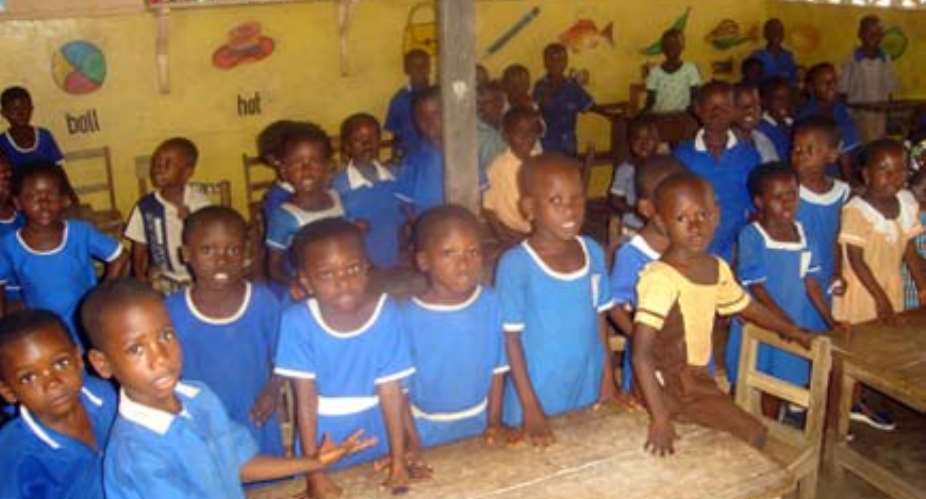Cape Coast, April 27, GNA - Participants at a forum agreed on Thursday that to improve on quality education delivery in the country, there was the need for the community, government, and Non -Governmental Organizations (NGO's) to partner not only to enroll but also to retain children of school-going age in school.
They made the suggestion at a Regional Education Advocacy Forum organized by the Central Regional Education directorate through its Partnership for Accountable Governance in Education (PAGE) to discuss and explore means to deal with the challenges confronting quality education delivery in the country.
The forum dubbed “Enrollment and Retention of School-Aged Children in Schools- The Role of Stakeholders” brought together major stakeholders including parents, teachers, traditional authorities, religious bodies, government bodies, NGO's, the Ghana Education Service (GES), the media, and the general public.
It was aimed at collating ideas to find solutions to the challenges.
It was also agreed that the education of a child was not a one-man responsibility but that of the community at large, stressing that the there should be advocacy and sensitization on enrollment, especially of the girl child.
The Rev. Dr. Eric Anum, senior lecturer at the Religion Department of University of Cape Coast (UCC), and guest speaker at the forum, who was very concerned about girl-child education, mentioned some challenges bedeviling the country's education system as inadequate facilities, repetition and dropout rates, economic and socio-cultural practices.
He indicated that the above mentioned factors did not make education attractive for school aged children, stressing that girls, especially, should be motivated through tutoring, mentoring and counseling and the abolition of certain traditional beliefs.
Rev. Anum mentioned other interventions as establishing child-friendly school principles, building institutional capacity for promoting girls' education, collaborating with government and other stakeholders in reviewing existing curricula, as well as monitoring and evaluating girl education programmes.
He said that the education system needed a complete paradigm shift and therefore suggested that stakeholders should provide more resources for schools, ensure strong partnerships, and establish school based management committees to improve teaching and learning.
Nana Amba Eyiaba, Queen of Efutu and Krontihemaa of Oguaa Traditional Area who chaired the forum, stressed that all stakeholders had roles to play in retaining children in school. She particularly admonished parents to first and foremost enroll their wards in schools and to provide them with the basic necessities.
Nana Eyiaba advised teachers to prepare adequately for classes, make full use of the time and take advantage of capacity building programmes, adding that GES had to ensure supervision, monitoring and provide in-service training for teachers as well as guidance and counseling for students.
She also entreated all the stakeholders to collaborate to build schools, recruit and motivate teachers, sensitize the public, institute award schemes for pupils and teachers, and urged the traditional authorities to also provide lands for school buildings.
PAGE is a three-year project funded by the United States Agency for International Development (USAID) in partnership with the Government of Ghana to support the Ministry of Education and GES in achieving the objectives of Ghana's Education Strategic Plan (ESP) 2010-2020.
PAGE supports two of the four ESP objectives which include improving quality of teaching and learning, and management of education service delivery.
GNA





 Former Kotoko Player George Asare elected SRC President at PUG Law Faculty
Former Kotoko Player George Asare elected SRC President at PUG Law Faculty
 2024 elections: Consider ‘dumsor’ when casting your votes; NPP deserves less — P...
2024 elections: Consider ‘dumsor’ when casting your votes; NPP deserves less — P...
 You have no grounds to call Mahama incompetent; you’ve failed — Prof. Marfo blas...
You have no grounds to call Mahama incompetent; you’ve failed — Prof. Marfo blas...
 2024 elections: NPP creates better policies for people like us; we’ll vote for B...
2024 elections: NPP creates better policies for people like us; we’ll vote for B...
 Don’t exchange your life for wealth; a sparkle of fire can be your end — Gender ...
Don’t exchange your life for wealth; a sparkle of fire can be your end — Gender ...
 Ghana’s newly installed Poland train reportedly involved in accident while on a ...
Ghana’s newly installed Poland train reportedly involved in accident while on a ...
 Chieftaincy disputes: Government imposes 4pm to 7am curfew on Sampa township
Chieftaincy disputes: Government imposes 4pm to 7am curfew on Sampa township
 Franklin Cudjoe fumes at unaccountable wasteful executive living large at the ex...
Franklin Cudjoe fumes at unaccountable wasteful executive living large at the ex...
 I'll 'stoop too low' for votes; I'm never moved by your propaganda — Oquaye Jnr ...
I'll 'stoop too low' for votes; I'm never moved by your propaganda — Oquaye Jnr ...
 Kumasi Thermal Plant commissioning: I pray God opens the eyes of leaders who don...
Kumasi Thermal Plant commissioning: I pray God opens the eyes of leaders who don...
